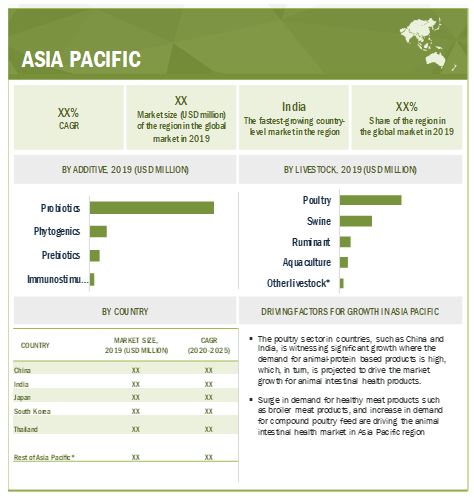COVID-19 Impact on the Animal Intestinal Health Market
The Animal Intestinal Health Market is estimated to be valued at USD 3.1 billion in 2020. It is expected to reach a value of USD 4.6 billion by 2025, growing at a CAGR of 8.0% during the forecast period. Factors such as a rise in the production of compound feed, an increase in demand for animal protein among consumers, growing incidences of intestinal disorders among livestock species. The shift towards natural growth promoters (NGPs) due to the increase in awareness about feed and food safety is also among the opportunities which aid in driving the growth of the market.
COVID-19 Impact on the Animal Intestinal Health Market:
Due to the pandemic, livestock producers have become increasingly concerned about the need to prevent viral infections among animals. Viral infections have a negative impact on the growth, gut health, performance, and reproduction of livestock species. Animal intestinal health nutrition products help in lowering the instances of viral infections and improving the overall intestinal health and immune response in the case of a viral infection in livestock.
Animal intestinal health nutrients, such as probiotics, prebiotics, phytogenics, and immunostimulants, play an important role as an alternative to antibiotic growth promoters that are used in feed products, which supports the gut immune system in livestock. Thus, feed producers are using nutrients, such as probiotics, which help in enhancing the microbial stability in the intestinal tract in livestock. In further, prebiotics are also included in intestinal feed products that have the potential to improve balanced intestinal microflora to enhance health and well-being.
In addition, phytogenics have evolved as a key feed additive, as they helped in increasing the feed intake, improving gut function, and preventing diarrhea, antimicrobial, and antioxidative effects on livestock. These nutrients play an important role in enhancing the intestinal immunity in livestock species. Thus, the pandemic would have a positive impact on the overall growth of the animal intestinal health market, as the release of lockdown in various regions has increased the consumption of high-quality animal-based food products, which, in turn, drives the market growth globally.
Asia Pacific is the fastest-growing market during the forecast period in the global market
The growth in population, rise in disposable incomes, rapid urbanization in the Asia Pacific region, and an increase in demand for high-quality meat products are the key factors that have encouraged the demand for feed additives.
Substantial growth is witnessed in countries, such as China, India, and Japan, due to the increase in the purchasing power of the population and demand for protein-rich meat diets. Pork and poultry are widely consumed in the Asia Pacific region. Moreover, consumers prefer opting for products that have high nutritional content and offer health benefits and exotic taste. Thus, fish and other seafood products are also a preferred option for consumers, which is also a growing industry in this region.
Key players in this market include Koninklijke DSM N.V. (Netherlands), Archer Daniels Midland Company (US), Kemin Industries, Inc.(US), DuPont (US), Cargill, Incorporated (US), Novozymes (Denmark), Nutreco N.V. (Netherlands), Chr. Hansen Holding A/S (Denmark), Bluestar Adisseo Co Ltd. (China), and Alltech (US).

Comments
Post a Comment